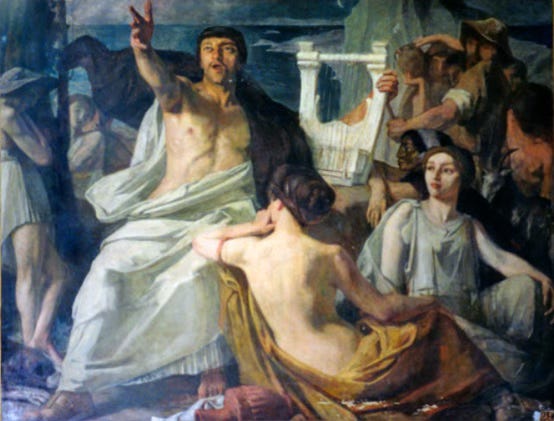Plato's Ion
Manage episode 433301794 series 3588922
The Practical Wisdom podcast I produce is not for the faint of heart. Each series of episodes presents a deep dive into a single text from the Greco-Roman wisdom tradition. From time to time, as in the case of this post, it may helpful to pause and collect together all the entries referring to the same piece of classical writing, so that people listeners can go back to them at their leisure, listen to them in sequence, and gain a broader appreciation of what they are about.
Today I present you with a collection of links to my commentary of Plato’s Ion, a strange short dialogue that pauses the question of whether poets know what they are talking about. Let me explain. Socrates meets the title character, Ion, who is a rhapsode, that is one of those people who went around declaiming poetry that they had not written. Ion’s specialty is Homer.
The rhapsodes didn’t just recite, though, they lectured, explaining to people all sorts of technical subjects as they understood them from studying poets like Homer. This doesn’t make a lot of sense to us today, but we are talking about a period of western history when poetry and mythology were not just art forms but sources of knowledge and understanding.
Then in the sixth century BCE a new kid appeared on the block: philosophy! Presocratics like Thales, Anaximander, Parmenides, Democritus, and so forth made the radical suggestion that the world could be comprehended by invoking natural causes so that the human mind could figure out what was going on without appealing to gods and myths.
When Plato wrote his dialogues, philosophy was still relatively new and philosophers had to compete with poets and rhapsodes in order to convince people that they were a better bet.
This, then, explains the dialogue we are examining, where Socrates, displaying more than a bit of sarcasm, attempts to show that Ion doesn’t actually know what he’s talking about.
The translation I used is the one by Trevor Saunders, published in Early Socratic Dialogues, Penguin, 2005. Here are the links to the pertinent episodes (free access):
The Philosophy Garden is a reader-supported publication. To receive new posts and support my work, consider becoming a free or paid subscriber.
20 episodes





